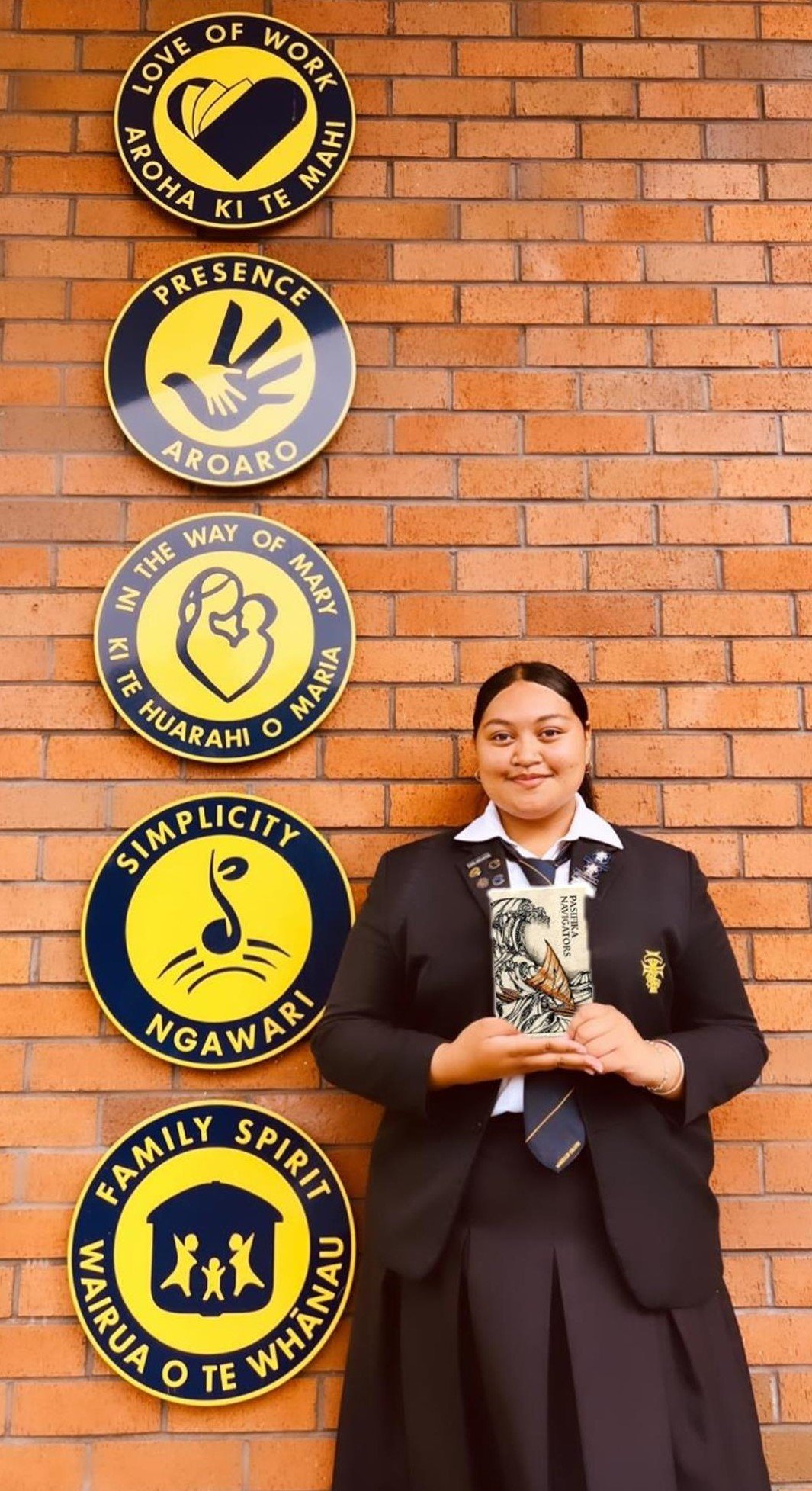Pasifika Navigators creates new generation of writers and readers
Authors:
Pasifika students
Publisher:
Mila’s Books
ISBN:
9780473651428
Date published:
21 March 2023
Pages:
124
Format:
Paperback
RRP:
$30.00
Pasifika Navigators is the world’s first Pasifika Student Poetry Collection. The book includes 52 Pasifika students (Year 7 – Year 13) authors from across Aotearoa, who have ties with Samoa, Tonga, Fiji, Tuvalu, Tokelau, Cook Islands, Papua New Guinea, Kiribati, Niue.
Launched on World Poetry Day, in March, publisher Dahlia Malaeulu, of Mila’s Books, says the book project started with an idea that has “for a long time been in my heart as a Pasifika mother, educator, author and Mila’s Books publisher.”
“I look at Pasifika Navigators and I see a collection of 52 Pasifika hearts and souls on paper. A range of Year 7-year 13 voices that have been waiting to be unleashed. Words that mirror many of our thoughts and feelings as Pasifika here in Aotearoa. And my favourite part, proud Pasifika tamaiti feeling empowered to be themselves.
The book has already made positive impacts in the lives of our tamaiti, schools, the families involved and beyond. One example is a school involved in the project is now offering a Pacific Studies course, for the first time in the school's history as a result of their contributing author's poems in our book.
Parents have shared how the book has been used to help open challenging cultural conversations within their own families and with their children's teachers. Class sets are being purchased and used as part of literacy programmes, and schools are using the text for professional learning development for their staff ... The power of our stories is real and Mila’s Books will continue to highlight this through the stories we produce for our tamaiti, and our Pacific peoples here in Aotearoa.”
Eniselini Ali, award winning Pasifika student poet and author of Dear Little Brown Kid: “In all honesty I was shocked I was even holding the Pasifika Navigators. My Dad gave it to me first thing in the morning and I was still in the process of waking up (lol). But, it took me a while to accept the fact that one of the most meaningful poems I have ever written is now published! I was in awe reading all the other students who are a part of this book, especially those who are much younger, and I am very happy for them to be blessed with this opportunity just as I am.
I believe that the world needs to hear our stories, especially those who aren’t physically connected with their motherlands. Being a part of this shows that our stories and languages play a big role in keeping our community, language and culture alive.
Having more by-youth-for-youth projects will only bring together our people and the wider community, and share the gift of storytelling.
My hope for those who read this book is to listen to the important messages our youth have. We may be young, but these poems are deep and mean more than words. Every word has a meaning, every person has a purpose; just as people are destined for greatness, words are destined to be heard and remembered. No word is too small or meaningless, especially if it comes from your true experience … and it is important to share it so that others will be inspired, educated and encouraged to share their stories as well.”
Joseph Koloa, author of Oku ‘iai ha kii fonua/ The ocean of our land: “My Tongan culture is very important to me and I carry it with me everywhere I go. I think our book is beautiful and so important. I hope everyone likes reading about what we kids’ think … what we go through and how we love our cultures. We are all together in one place in the book and it makes me smile thinking about our parents and grandparents reading it. They will all be so proud like mine.
Thank you so much for including me in the book, it makes me want to write more and maybe publish my own stories for the world one day. We need more of this for Pasifika students in New Zealand.”
Amelia Kerisiano, author of Tropical Blend: “The thing that I mostly enjoyed about our book was being inspired by the other girls that are around my age, writing about their journey. It also inspires me to tell people who I am but also not be afraid of this. The first time I heard Dahlia's story that inspired me to write a poem about my story. I have learnt that there is much more you are capable of and don't give up on who you are. Don't give up, there is a time where you are gonna shine. Be proud of where you come from and who you are as a person.
I want people to read the book and see what they could do to improve things for us Pasifika students. It is very important for us to tell our stories because there are people who may be going through something similar but don't know what to do and telling your story may inspire them not to give up. I also think it gives confidence to others too.”
Amira Va'a, author of Grandpa’s Blue Eyed Taro Princess: “It was exciting to be involved in the project and was even more special when I held the book in my hands. I felt very proud at being an actual published author especially when my Grandad read my poem and cried.
Projects like this are so important for us as they put our real thoughts and feelings out there so we can be heard in a positive way and help teach others about our beautiful Pacific cultures. I hope the readers of the book enjoy reading about the different perspectives and poems we shared because our cultures are important.”
Siobhan Sa’u, author of Laugutu - I enjoyed getting the chance to explain my middle name and my life as a young Pasifika girl. This Pasifika Navigators book project taught me how to be proud of myself, my background and who I am. My message for those that are going to read this book is to be proud of who you are and where you come and I hope they are inspired by the different poems. We must remember to take pride in our cultural backgrounds and where our ancestors grew up and came from.
Bekah Sa’u, author of What do you see? “What I really enjoyed from our Pasifika Navigators book is both the aesthetic value it holds, in terms of the art pieces within the book, as well as the content within the stories of Pasifika students of various ages and backgrounds across New Zealand. I love how all the stories, experiences and accounts are unique to each person, but also have cultural experiences and elements that other young Pasifika people across Aotearoa may share and relate to.
This collection of stories is so empowering and I believe is crucial to have, so that the positives and negatives, challenges and successes as Pasifika are shared and eventually understood, especially in the evolving society we live in today.
I hope that those who read these stories, and are of Pasifika descent feel empowered and heard, and that it encourages them to stand firm in their ancestral and cultural roots. To those who are not of Pasifika descent, I hope they learn from these stories, from a place of understanding and education. Fa’afetai Lava.”
Logan Woolley, author of Grandma & Nana: “I enjoyed everything about this book project. Actually holding the finished book makes me even more proud to be part of it.
My family are really proud of my brother and I for our poems. I know people are really going to enjoy another awesome resource for us from Dahlia and Mila’s Books.
This book has taught me that we need more of our languages, cultures and identities explored and accepted at school. I hope readers look to understand the creators of the poems and see how brave they really are in sharing their stories.”
Janet Selesele, author of Expect the Unexpected: “I am so proud and happy I’ve finally accomplished something I never thought I’d be able to do. I think it’s important Pasifika students do projects like these because our stories should be heard. I want readers to feel inspired to speak up and have the confidence to overcome challenges they face in life.”
Lili Williams, author of Mother Tongue: “It feels great that my struggle about losing my mother tongue, my Samoan language, is going to help someone else to know that it's okay and it's never too late to reconnect with your language or culture. I think the book is important because our Pasifika kids need to be more aware of how their voices and words can create change. I hope that the readers really take time to connect with these poems and support the need to create more spaces for our voices and to really listen to us.”





